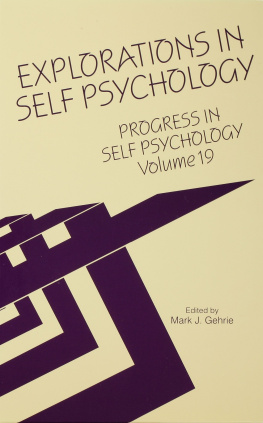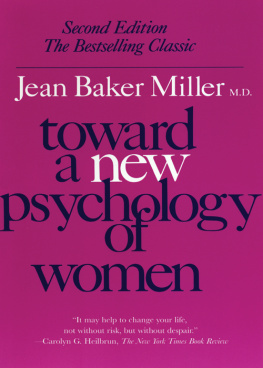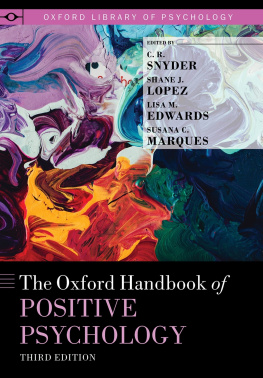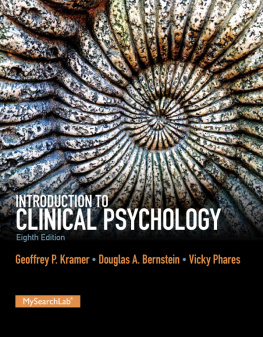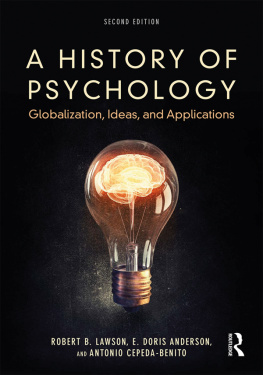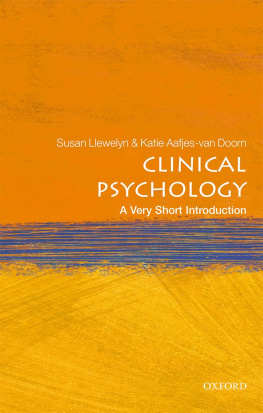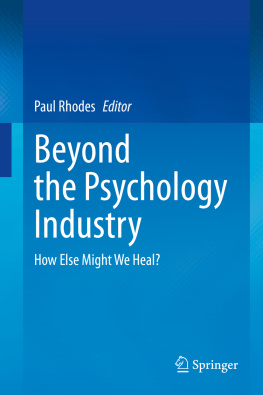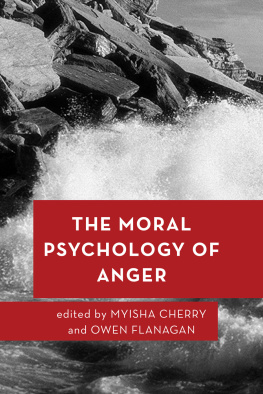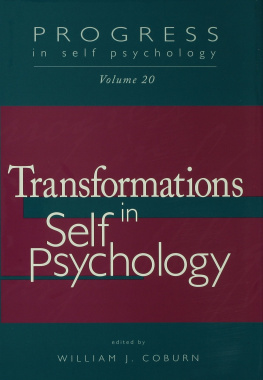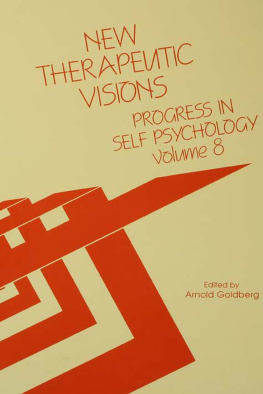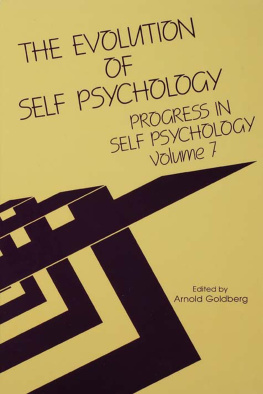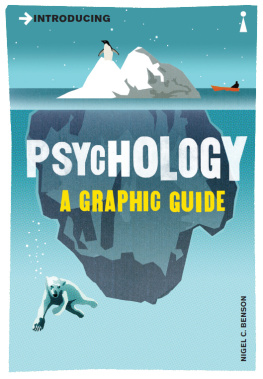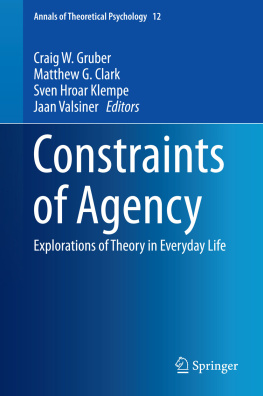EXPLORATIONS IN SELF PSYCHOLOGY
Progress in Self Psychology Volume 19
Progress in Self Psychology
Editor, Mark J. Gehrie, Ph.D.
ASSOCIATE EDITORS
James L. Fosshage, Ph.D.
Hans-Peter Hartmann, M.D.
Wolfgang E. Milch, M.D.
Estelle Shane, Ph.D.
EDITORIAL BOARD
James M. Fisch, M.D.
Henry Friedman, M.D.
Daniel Kriegman, Ph.D.
Robert J. Leider, M.D.
Arthur Malin, M.D.
Russell Meares, M.D.
Anna Ornstein, M.D.
Paul H. Ornstein, M.D.
Gary Rodin, M.D.
Allen Siegel, M.D.
Judith Guss Teicholz, Ed.D.
Marian Tolpin, M.D.
Paul H. Tolpin, M.D.
EDITORIAL ASSISTANT
Christine Susman
Contributors: Please submit your original manuscript (double-spaced, including references, footnotes, quoted passages, and dialogue) via email as an attached file in MS Word format (Progress@ psychologyoftheself.com). The manuscript style should conform to previous issues of Progress and must include all footnotes and complete references. All submissions are refereed and will not be returned. If an electronic version is not available, please mail the original manuscript and four copies to:
William J. Coburn, Ph.D., Psy.D.
12011 San Vicente Blvd., Suite 300,
Los Angeles, CA 90049
Explorations in Self Psychology
Progress in Self Psychology
Volume 19
Mark J. Gehrie
editor
2003 by The Analytic Press, Inc.
101 West Street
Hillsdale, NJ 07642
All rights reserved. No part of this book may be reproduced in any form, by photostat, microfilm, retrieval system, or any other means, without prior written permission of the publisher.
www.analyticpress.com
ISBN 0-88163-373-9
ISSN 0893-5483
Printed in the United States of America
10 9 8 7 6 5 4 3 2 1
Contents
| Mark J. Gehrie |
| Henry J. Friedman |
| Stan T. Dudley and Todd F. Walker |
| Lester Lenoff |
| Diane Lawson Martinez |
| Marc L. Miller |
| Anna Ornstein |
| Jan L. Rieveschl and Michael A. Cowan |
| Michael Shoshani and Batya Shoshani |
| Mark D. Smaller |
| Jeffrey Stern |
Panel: The Role of the Relationship in the Therapeutic Process
The Case of Patient J and Discussions: Introduction |
| Estelle Shane |
| Joye Weisel-Barth |
| Lewis Aron |
| Interpretation, and There Is No Interpretation Without Relationship: A Discussion of Joye Weisel-Barth's Clinical Case |
| Robert D. Stolorow |
| Joye Weisel-Barth |
| Estelle Shane |
| Richard M. Childs |
| Miriam Elson |
| Eva Rass |
| Gordon A. Schulz |
| Hideki Wada |
| Constance Goldberg |
Lewis Aron, Ph.D. ABPP is Director, New York University, Postdoctoral Program in Psychotherapy and Psychoanalysis; President, International Association of Relational Psychoanalysis and Psychotherapy (IARPP), New York City.
Richard M. Childs, M.D. is Clinical Professor of Psychiatry, University of Missouri at Kansas City; Distinguished Life Fellow, American Psychiatric Association.
Michael A. Cowan, Ph.D. is Professor, Loyola University, New Orleans.
Stan T. Dudley, Ph.D. is the Educational Director, Cincinnati Center for Self Psychology; Member, Cincinnati Association for Psychoanalytic Thought.
Miriam Elson, M.A. is Emerita Lecturer, Masters Degree Program of the School of Social Service Administration, University of Chicago.
Henry J. Friedman, M.D. is Associate Clinical Professor of Psychiatry, Harvard Medical School; Teaching and Supervising Psychoanalyst, Massachusetts Institute for Psychoanalysis (MIP).
Constance Goldberg, M.S. is Faculty, Institute for Clinical Social Work and Center for Religion and Psychotherapy, Chicago.
Lester Lenoff, M.S.W. is Faculty, Training and Research Institute for Self Psychology (TRISP) and Faculty, Group Department of the Postgraduate Center for Mental Health, New York City.
Diane Lawson Martinez, M.D. is Training and Supervising Analyst, Houston-Galveston Psychoanalytic Institute.
Marc L. Miller, Ph.D. is an Executive Committee Member, Faculty and Supervising Analyst, Suffolk Institute for Psychotherapy and Psychoanalysis, Smithtown, New York; Faculty and Supervisor, Adelphi University, Derner Institute, Post-Doctoral Program in Psychotherapy and Psychoanalysis, Garden City, New York.
Anna Ornstein, M.D. is Professor Emerita, University of Cincinnati; Lecturer in Psychiatry, Harvard University, Cambridge, Massachusetts.
Eva Rass, Ed.D. is Director, Lecturer and Supervisor, Institute of Analytic Child and Adolescent Therapy; Lecturer, University of Pedagogy, both in Heidelberg, Germany.
Jan L. Rieveschl, Ph.D. is in private practice of clinical psychology, New Orleans.
Gordon A. Schulz, Psy.D. is Staff, Child Abuse Unit for Studies, Education and Services, Chicago.
Estelle Shane, Ph.D.is Training and Supervising Analyst, Institute of Contemporary Psychoanalysis and the Los Angeles Psychoanalytic Society and Institute; Clinical Faculty, UCLA Department of Psychiatry.
Batya Shoshani, D.S.W. is Senior Lecturer and Faculty Member, The Paul Baerwald School of Social Work, The Hebrew University of Jerusalem; and Member, Tel Aviv Institute for Contemporary Psychoanalysis.
Michael Shoshani, Psy.D. is Faculty, Postgraduate School of Psychoanalytic Psychotherapy; Senior Lecturer and Supervisor, Bar-Ilan and Tel Aviv Universities; Founding Chair, Tel Aviv Institute for Contemporary Psychoanalysis; and Founding Chair, Israel Psychoanalytic Journal.
Mark D. Smaller, Ph.D. is Faculty, Institute for Psychoanalysis; Faculty and Board of Trustees, Institute for Clinical Social Work, Chicago.
Jeffrey Stern, Ph.D. is Faculty, Institute for Psychoanalysis; Lecturer in Psychiatry, Pritzker School of Medicine; Lecturer in Humanities, University of Chicago; Lecturer in Psychiatry, Rush University, Chicago.
Robert D. Stolorow, Ph.D. is Founding Faculty Member and Training and Supervising Analyst, Institute of Contemporary Psychoanalysis, Los Angeles.
Hideki Wada, M.D. is Psychiatric Consultant, Kawasaki Saiwai General Hospital; Faculty of Medical Economics, Hitotsubushi University, Japan.
Todd F. Walker, Psy.D. is Adjunct Professor at the School of Professional Psychology, Wright State University, Cincinnati, Ohio.
Joye Weisel-Barth, Ph.D., Psy.D. is a member if the Institute of Contemporary Psychoanalysis (ICP) and the Los Angeles Psychological Association.
Mark J. Gehrie
G iven the rapid proliferation of theory and techniques in self psychology, various examples of which are represented in this volume, I am inclined to offer a comment based on a long-term view of the implications of some of these ideas. I think it is useful to recall that when Heinz Kohut began his paradigm-shifting work on narcissism, he was operating from within the "one mind" perspective of ego psychology, an unabashedly modernist, objectivist position that viewed the psychological data at issue in psychoanalysis as "inside the head" of the analysand. As the complexities of the "widening scope" began to reveal themselves in the actual clinical psychoanalytic endeavor, however, it became increasingly difficult to maintain that position; even Kohut's emphasis on the "subjectivity" of the patient began to yield increasingly to the impact (and hence role) of the analyst's subjectivity, the implications of self-disclosure by the analyst, and the intersubjective context of analysis. Rapidly, as our selection of patients with more archaically organized developmental derailments began to increase (and our ability to recognize these issues also increased), there evolved a growing emphasis on the idea that manipulating the actuality of the dyadic relation in psychoanalysis could be mutativein large part, I believe, because of the often overwhelming difficulties that occurred in attempting to access primitive, split-off states and subject them to "analysis" in the usual sense. It became, in other words, much more difficult to properly apply "analytic" principles to instances in which the pathology in question was often characterized by global archaic (and often negative) transferences, which were extremely difficult to interpret without major disruption of narcissistic equilibriium and that were also often embroiled with severe character pathology. The increasing emphasis of those theories that shift the focus of emphasis toward the relationship in the moment, often at the expense of the consideration of the unconscious, provided an apparent solution to this mounting technical problem by offering a shift in the focus of what was at issue: instead of what was "inside the patient's head," we are now singularly invited to address "the relationship between us," as if this shift could somehow do away with the underlying structural issues that the patient brings in; in other words, that which was more accessible in these difficult clinical encounters became defined as the locale for influence at the expense of the underlying configurations.

